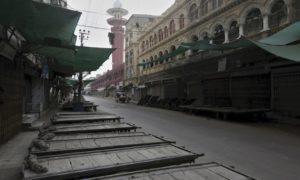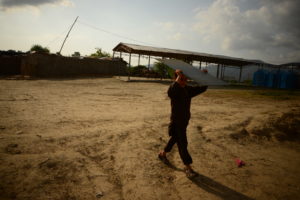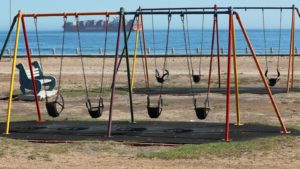A personal reflection on International Street Children Day in the context of the COVID-19 crisis, by CfC Founder Madeeha Ansari.

Today was the International Day for Street Children. It passed, unmarked, barely ruffling the stillness of these days of quarantine. In this, the strangest time in living memory, it is hard to be stirred by anything beyond the heightened consciousness of ones own fragility.
The war has come home.
It has swept the world in a quiet wave, pushing over the foundations of the lives we took for granted. And while we wait in our fortresses surrounded by cloudy dread, it is of course difficult to spare space in our minds, our newsprint and our Twitter feeds for those who are invisible on a clear day.
But clarity matters. It’s important to know that those empty streets and stillness come at a price. Not all have the security of fortresses, and everyone needs to care. Like it or not, this is a war that we really are all in together.
Why care now?

Street-connected children are those who live on the streets, work on the streets or depend on the streets for survival in some way. So some have homes to return to, and some don’t. Many of the safe spaces they used to access, such as drop-in centres, are closed until further notice.
Social media has come alive with some trends that are repeated, because they are important. Here’s why #SafeSpacesForStreetChildren matter too:
#PublicHealth
Without access to information and adequate medical care, many children, young people and adults living in urban poverty are at risk of contracting and spreading coronavirus without even knowing. Contrary to initial observations, children too are affected by it – especially if they have low immunity. The danger of this insidious disease is that it can be carried without exhibiting any symptoms – which, for congested slum communities, can have exponential, catastrophic consequences.
#StayHome
Everyone agrees that the “smart” thing to do right now is to stay home. But what of those for whom the street is home? Children who experience homelessness or live on the streets are at risk of police harassment and of being detained in overcrowded, unsanitary conditions. In places like Pakistan where prisons are already overflowing and that hazard is being recognised, the last thing we want is for street children to be criminalised.
#WashYourHands
The new rule is “at least” 20 seconds. But what about those who lack access to clean water and sanitation?
#SocialDistancing
When ten people are crowded into a single room, with ten single rooms in close proximity, this is hardly an option. Furthermore, families in lockdown conditions are under extraordinary stress, especially when livelihoods are being affected. The risk of unreported domestic abuse rising is a terrifying thought.
What then?

There has been a rise in global generosity at this time, which is beautiful to see. Individuals and organisations are stepping up to provide monetary and in-kind support to families whose income has been disrupted and who will bear the brunt of this crisis. Government, too, has taken notice and there have been some historic efforts in terms of emergency support.
However, the wave seems to have swept away some of the principles that took a long time to build into good practice – for instance, looking at how vulnerabilities can differ according to gender and age. Perhaps the champions of those sensitive approaches are themselves under too much psychological and emotional strain to speak up, but they should be factored in so the impact of generosity is magnified.
It is important to see children, and for at least some of us to put them at the centre of what we are doing. Then we will be able to see their needs, and address them accordingly – in terms of disseminating life-saving information in ways that they can understand and practically apply; in terms of creating life-saving options for hygiene; and ensuring safe spaces for them to live.
Today was the first day of summer. Through the open window, the birds haven’t ceased their busy exchange; the blossoms are at their most dazzlingly proud. For so many, it has been a gentle war. But it is without end, unless we dare to care.
